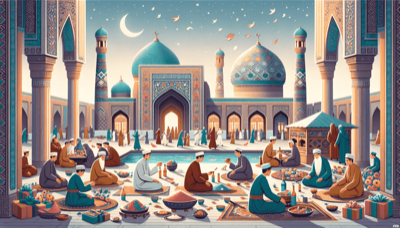We're here to help you keep count of the days to or since a date. Just click the button below and enter your chosen date to get started. Also choose the suggested days or search for a special day above #countingthedays

Eid al-Adha, also known as the Festival of Sacrifice, is one of the most important Islamic holidays and is observed with reverence in Uzbekistan. This religious holiday commemorates the willingness of Prophet Ibrahim (Abraham) to sacrifice his son as an act of obedience to God, before God provided him with a ram to sacrifice instead.
The origins of Eid al-Adha are rooted in Islamic tradition and are connected to the Hajj pilgrimage, which is one of the Five Pillars of Islam. Although not all Muslims make the pilgrimage to Mecca, Eid al-Adha is celebrated by Muslims around the world.
In Uzbekistan, as in other Muslim-majority countries, traditional practices include:
Takbir: The recitation of Takbir (declaring the greatness of God) is a significant part of Eid celebrations and can be heard from mosques.
Prayer: The day begins with Muslims performing the Eid prayer at mosques or designated prayer grounds.
Sacrifice: Following prayers, those who can afford it will sacrifice an animal such as a sheep or goat. This act symbolizes Ibrahim's readiness to sacrifice his son. The meat from the sacrifice is divided into three parts: one for the family, one for relatives and friends, and one for those in need.
Charity: Giving to the less fortunate is a significant aspect of Eid al-Adha. Sharing meat ensures that those who are poor can also partake in the festivities.
On this day:
Eid al-Adha provides an opportunity for Muslims in Uzbekistan to demonstrate solidarity with others around the world while engaging in acts that reflect devotion, compassion, and community spirit.